Why Minecraft is more than just another video game
- Published
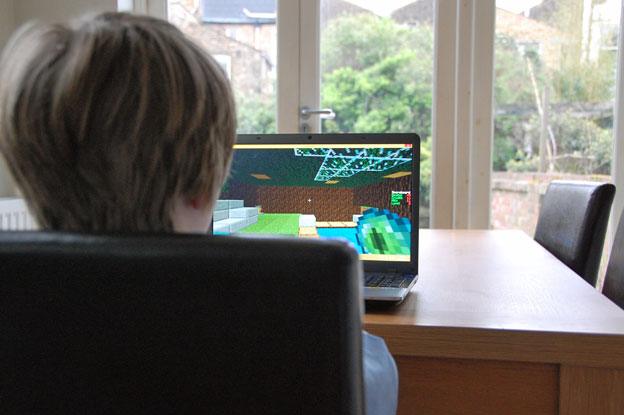
Minecraft's creators revealed this week that the blocky freeform building game has 33 million users. It can easily become an obsession.
"You've exceeded your usage allowance," read the email from my ISP.
I was pretty sure I hadn't but I know a couple of people, my two boys, who might have done it for me.
That message clued me in to the depth of their obsession with Minecraft.
The game is set in a virtual world made of cubes of different materials - dirt, rock, sand, lava, obsidian and many more. Almost all of these can be used as building blocks and a few can be refined into usable raw materials (wood, iron, diamond etc).
Playing the game involves surviving by using blocks to build a shelter (which can be as crude or elaborate as you like) and turning raw materials and combinations of them into items (swords, armour, bows) to help kill the game's many monsters (creepers, skeletons, zombie pigmen etc).
From such an uncomplicated setting has grown a gaming phenomenon. The community of people involved with the game numbers in the tens of millions. Many of those fans are children, mainly boys, aged between nine and 15 - among whom it is almost a religion.
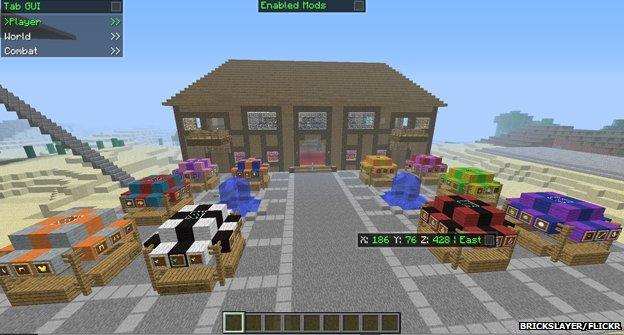
My two nine-year-olds - Toby and Callum - are devoted members of that congregation. They spend a lot of time playing Minecraft, talking about playing Minecraft and, as I found out from my ISP, watching YouTube videos of other people playing Minecraft.
For Liz Cruddas, whose two boys Oliver (15) and Will (9), are equally firm fans, the time spent glued to YouTube is baffling.
"I don't know why they want to watch these videos," she says, "but they are just fascinated by watching these people play the game."
Oliver Cruddas says he watches the videos, made by Minecraft celebrities such as Lewis and Simon from Yogscast, SkythekidRS, CaptainSparklez, BajanCanadian and CupQuake among others, so he can be a better player.
"There are some that help me with the game, they make it easier to play Minecraft," he says.
My son Toby echoes his comment and says he watches Minecraft videos for the same reason football players watch matches on TV. He sees what the best can do and gives him ideas about what to try in the game.
That's all very well but I, like many other parents with Minecraft-obsessed kids, wonder if they are wasting their time. Surely the whole experience can be made educational?
Perhaps it could be the route they use to get to grips with that most coveted of skills - computer programming.
"In the real world it is very rare for a kid to encounter a problem that programming would be a way for them to solve," says Daniel Ratcliffe, a game developer who has made a mod for Minecraft, called ComputerCraft, that adds programmable computers and robots to the game world.
By contrast, he says, Minecraft is rich in tasks that computer-controlled robots could help solve.
"If they play Minecraft, they are extremely invested in this world and can think of things that are real to them in that virtual world they can solve with programming."
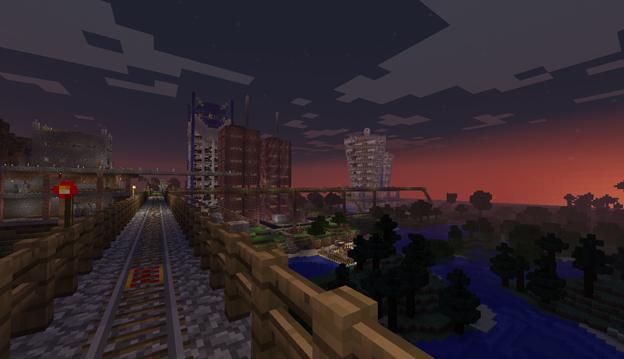
But what about other technical skills - can their obsession demystify computers and networks?
"My sons are both managing their own servers with parental overview from me, and it's been a good experience in learning the issues that come from managing any server type system," says Andrew Weekes, whose two boys are big fans.
His younger son learned a hard lesson early on, says Mr Weekes, when his failure to keep back-ups meant he could not restore his favourite Minecraft world.
Playing Minecraft has also led his younger son to getting to grips with some basic computer concepts.
"We had discussions about Boolean logic (AND/OR/ NOT etc), which is a pretty advanced concept to be talking to a nine year old about."
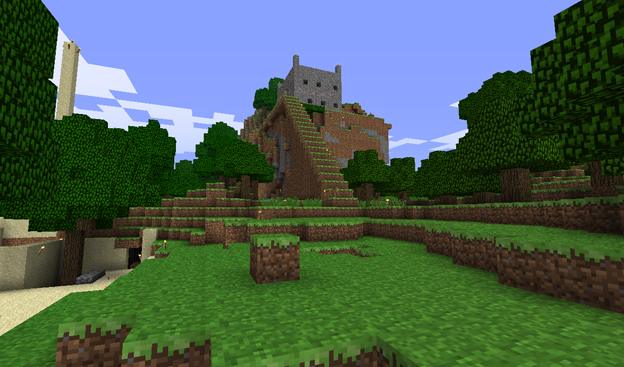
Minecraft players can create intricate virtual worlds
The game also bestows some technical competence.
Any regular player will be adept at using the game's "slash commands", can install texture packs to change its look and make their own skins for in-game characters. They can find multiplayer servers, use email to set up sessions with friends and use Skype so they can shout at each other in games rather than just type comments. They might also be recording, editing and uploading their own YouTube videos of what they get up to.
Christy Wyatt, head of Good Technology and mum to another Minecraft fan, says parents might well be surprised at what their children have built in the game.
"My initial reaction was that it was just another video game," she says. "Now I think of it as digital Lego and he is using it to build all these amazing things."
Her son's fondness for the game has had other benefits too, ones that go beyond the computer.
"My son does have some challenges with the kids at school," she says "but Minecraft is the thing that brought them together."
I've seen the same with my kids. I rented a server for them and it has become a hangout for them and some of their friends. It's a useful place, given that they tend not to just go out and play with their friends like their parents used to when they were young.
Teacher Joel Levin has seen the positive effect Minecraft can have on relationships among schoolchildren - especially on those who would otherwise be dismissed for being too geeky.
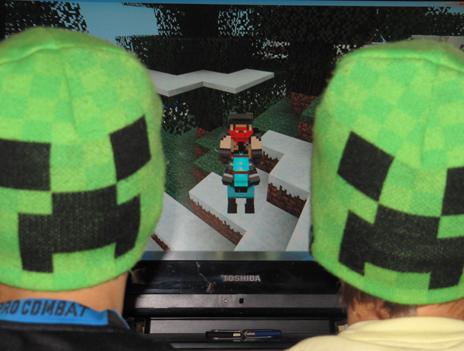
Mark Ward's sons enjoy Minecraft (in Minecraft-themed hats)
"Suddenly those computer skills become transferable into social capital," he says.
Mr Levin is the co-ordinator of Minecraftedu which was set up to show how the game can be used in classrooms. About 1500 schools are now using it as a teaching aid and not just in computer science lessons.
He also hopes Minecraft can teach parents a thing or two rather than them wanting the game to teach their kids.
"If this is something your kid is passionate about you owe it to them to take an hour or two to figure it out," he says.
And that's perhaps the best thing about the game - the shared times and stories we've had playing it together. Like that time we got ambushed by a creeper, which blew up and dropped us into a cavern, and we only had one torch and had to find our way back. Or the first time we killed the Ender Dragon or the time they showed me around the giant elaborate treehouse they had built and the... Well, you get the idea.
You can follow the Magazine on Twitter, external and on Facebook, external
- Published26 November 2012
- Published26 November 2012
- Published10 July 2012
- Published10 July 2012